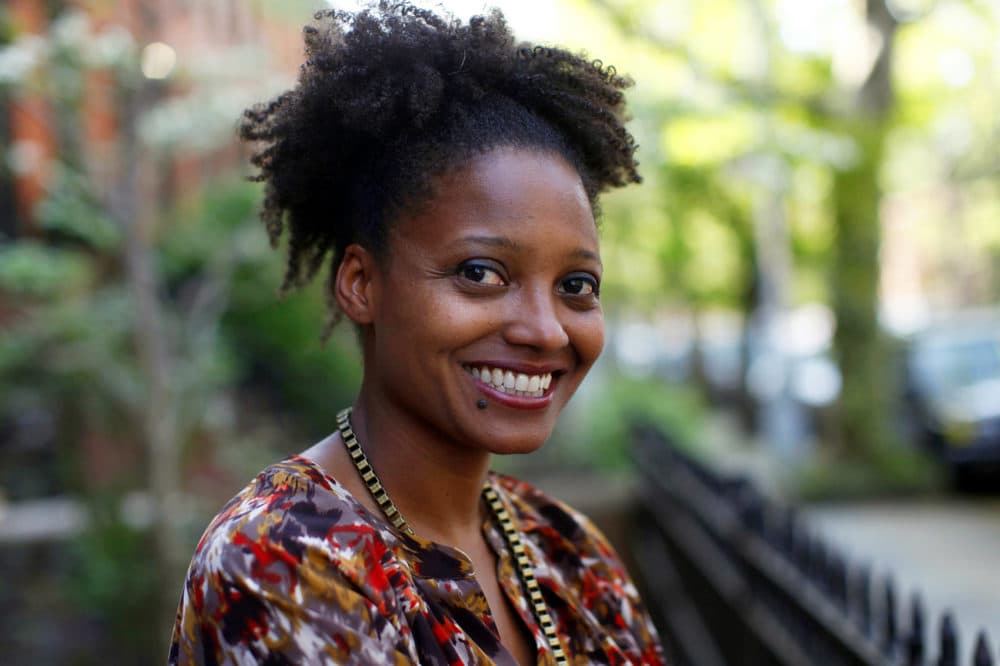Advertisement
Former U.S. Poet Laureate Tracy K. Smith's Poetry Road Trip Across America

Pulitzer prize-winning poet Tracy K. Smith spent a year traveling the country as U.S. poet laureate. Who did she meet — and what did she learn — about a nation that seems at odds with itself?
Guest
Tracy K. Smith, former U.S. poet laureate from 2017 to 2019. Professor of humanities, creative writing, and chair of the Lewis Center for the Arts at Princeton University. Author of four volumes of poetry books, including "Life on Mars," which won a Pulitzer Prize. Author of the memoir "Ordinary Light."
From The Reading List
Library of Congress: "American Conversations: Celebrating Poems in Rural Communities" — "When I was first appointed to this post, I dreamed of using poetry as a way of building a bridge between people in cities and university towns, where poetry festivals and reading series are quite common, and those in rural parts of the United States, where such programming doesn’t often reach.
"Because poems put us in touch with our most powerful memories, feelings, questions and wishes, I imagined that talking about poems might be a way of leaping past small-talk and collapsing the distance between strangers. On each of my trips so far, poetry has done just that. I’ve felt immensely lucky to have been welcomed into so many warm and vibrant communities, but in some ways it’s been a private pleasure. I hope to use this website as a way to share this experience with the rest of America."
Princeton Alumni Weekly: "Q&A: Tracy K. Smith on Poetry in the Heartland" — "When Professor Tracy K. Smith became poet laureate of the United States in 2017, she embarked on a series of trips to bring poetry, she says, 'to parts of the country where literary festivals don’t always go.' Her travels took her to rural areas in Alaska, Kentucky, Louisiana, South Dakota, and other states, where she visited not only libraries but also prisons, rehab centers, retirement facilities, and youth detention centers.
"Smith, the author of four books of poetry, won the 2012 Pulitzer Prize, and her memoir, Ordinary Light, was a 2015 finalist for the National Book Award in nonfiction. With her two-year tenure as poet laureate concluded, Smith took over in July as chair of the University’s Lewis Center for the Arts, succeeding theater scholar Michael Cadden, who led the center for eight years. Smith talked to PAW about what she learned from her travels, why small libraries are so critical to communities around the country, and why she is writing librettos for operas.
"What inspired you to focus your work as poet laureate in rural America?
"I was trying to think about what poetry specifically could do at this moment in America. What I believe poetry invites us to do is to really listen to each other earnestly, in good faith. Poetry makes you alert, and it makes you beholden to another perspective, and I thought that could be a great shift in approach for the country. We’ve been talking at one another, talking about one another, defending our positions, and in the process exacerbating the sense of division.
Advertisement
"On your visits, you gave audiences an anthology of American poetry, and together you read and then discussed poems. How were you able to make people comfortable?
"There were plenty of people who felt some apprehension talking about poetry. My job was to say right off the bat, 'Whoever you are, you have the necessary skills to talk about this poem. You don’t need a specialized vocabulary. All you need to do is pay attention to what’s happening in this poem, what it causes us to see, feel, wonder, and notice.'
"People offered great observations about language and imagery. At a rehab center in rural Kentucky, someone said, 'I know this is a love poem, but this is giving me a new way of thinking about my relationship with drugs. It was a love affair.' "
The New York Times: "Tracy K. Smith, America’s Poet Laureate, Is a Woman With a Mission" — "One night in the summer of 2014, when she was teaching at the Middlebury Bread Loaf School of English in Vermont, Tracy K. Smith dreamed she was reading a poem printed on a wall. At first she thought it was by another poet, but as she reached the end, she realized it was her own. ;If I wake up, I can get it,' she told herself.
"She sat up in the night and wrote down the poem. It imagines two mowers more than a mile apart, cutting grass all day long. Every so often, one raises his arm — 'Hello!' 'You there!' — and the other responds in kind. With a nod to Robert Frost, who was a mainstay at Bread Loaf for 42 years, Smith called it 'The Mowers.'
"Two years later, in December 2016, Smith read the poem at a birthday tribute to Emily Dickinson, one of her longtime favorite poets, at the Folger Shakespeare Library in Washington. The library is only a few blocks from the Capitol, and Smith, reflecting on the poisonous climate of the election, suddenly realized 'The Mowers' had a political meaning. 'It’s a poem that has this wish for effortless comprehension,' she told me one morning in February as we drove east, accompanied by a small entourage from the poet laureate’s office, along Route 17 toward Charleston.
"We had come from Adams Run, S.C., where Smith had just given a reading. 'There’s a line: "held/in that instant of common understanding," ' she continued. 'They’re doing their work, and every now and then they stop and look over toward where the other person must be, and there’s something that goes back and forth.' She renamed it 'Political Poem,' the title under which it appears in 'Wade in the Water,' her new collection, out from Graywolf Press this month. 'I liked giving it a title that suggests a really dogmatic poem and then having it behave the way it does,' she said."
The New York Times: "Tracy K. Smith’s Work Diary: The ‘Nonstop Rush’ of a Poet Laureate" — "Poets, in the popular imagination, are solitary figures who spend long quiet hours in isolation, waiting for inspiration to strike. In reality, they’re more likely rushing to faculty meetings, digging out from under unanswered emails and maybe — if they’re lucky — squeezing in an hour of reading or writing.
"Tracy K. Smith, one of the most successful, celebrated and productive writers in her field today, is intimately familiar with the daily struggle between creativity and the administrative work of an in-demand poet.
"Ms. Smith, 46, who is serving her second term as the United States poet laureate, has traveled the country as an evangelist for her medium, holding readings and workshops in small towns, schools and juvenile detention centers. She has published four volumes of poetry, including the Pulitzer Prize-winning 'Life on Mars,' as well as a memoir. Ms. Smith has also written two opera librettos: for 'A Marvelous Order,' about the city planner Robert Moses and the urban activist Jane Jacobs, and 'Castor and Patience,' about a Southern family dispute over land rights, which was commissioned by the Cincinnati Opera and is set to open in 2020."
This program aired on January 15, 2020.

